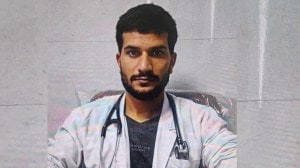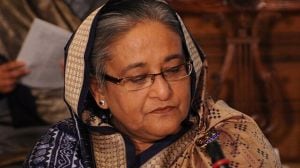Independence Day Special: Filmmaker and animator Suresh Eriyat on how processions have been the theatre where freedom is performed
Freedom, when it arrived, wasn’t a firecracker burst. It was a slow, noisy, moving, dancing, grieving, singing thing
 Conceptualised by Suresh Eriyat
Conceptualised by Suresh EriyatI asked my 95-year-old father how it was when India won its freedom on August 15, 1947. He was 17 years old then. But strangely, when I asked him, he didn’t have much to say.
That caught me off guard. My father is not the sort who runs out of stories. He usually has plenty — anecdotes rich with colour, exaggerated just enough to make you smile and a memory for details that rivals fiction. But this time, he just looked at me, as though I had asked him about someone else’s life.
He wanted me to give him clues. “What do you want to know?” he asked, as though freedom itself had become too abstract to remember. Then I recalled something: he always loved processions.
Any kind. Political rallies, religious parades, protest marches, temple utsavams, funeral cortèges — you name it. He would always take me by the hand and run to the gate when we heard distant drums or the sound of marching feet. The crowd, the rhythm, the collective emotion — he was an audience to them all, regardless of what was being said or sung. He simply loved the spirit of movement.
And I think that’s how he experienced Independence, too — not in that exact moment of political handover or Nehru’s speech, but in the after-sounds, the processions that followed. Not just the ones celebrating freedom, but all the ones that came after — the constant streaming of people onto streets, asserting something, asking for something, mourning, rejoicing, living.
Because let’s face it — freedom doesn’t change anything overnight. Especially when you are 17, and your world hasn’t quite shifted yet. There’s no dramatic flash of lightning or tearful applause. For many, it might have been a day like any other. And that might explain the blankness in my father’s recollection. But, perhaps, it wasn’t really blank. Perhaps it was something else — something unspoken and slow. A deep feeling without a dramatic vocabulary.
My father grew up without a father himself. His elder brothers were kind but they weren’t storytellers. They didn’t pass down memories of the freedom struggle or political awareness in any structured way. And in a society where most stories of the freedom movement were framed around the participation of men, perhaps, he didn’t know what role he was expected to have. That kind of silence sits heavy in a memory.
But Kerala was one of those places, I’ve heard, where everyone participated — men, women, students, workers. It wasn’t the kind of movement where a few did all the heavy lifting. And so, I like to believe, even if he wasn’t marching, he was watching. Watching everyone walk. Watching change go by.
That watchfulness stayed with him. He never missed a demonstration. Even in later years, I remember him reading out loud the slogans from placards held by striking unions or humming along with temple chenda melams as they passed our house.
I used to shout ‘Ingulab Sindabad!’ (quite a few years later I realised it was ‘Inquilab Zindabad’) and run around our home with the same spirit of the demonstrators — completely oblivious to what it meant.
I think processions, for him, and later for me, became the theatre where freedom was performed. Where he could witness something alive. Freedom, when it finally arrived, wasn’t a firecracker burst. It was a slow, noisy, moving, dancing, grieving, singing thing.
And I often wonder if, in those processions, he didn’t also see other things. Spirits, maybe. Ghosts. His stories were always full of them. Myths that belonged to our land — yakshis, gandharvas, bhoothams.
I have a theory. When the British brought rationality and science into our systems, they also quietly erased a lot of our own myth-worlds. Superstitions, they called them. And with them, a whole ecosystem of spirits and inherited fears and fascinations disappeared from public discourse. But maybe, with freedom, some of them came back. Not to haunt, but to be part of us again. Maybe that’s what he saw in the processions. Not just people but the myths we weren’t afraid to carry anymore. A freedom not just for the body but for imagination. For the ghosts, too.
And that’s the drawing I want to make for August 15 this year. My father and I watching a procession go by. In it, people of every kind. The living. The long-gone.
Today, public processions and demonstrations feel fewer, often restricted or reshaped. The freedom to walk together — to protest, to celebrate, to simply be in movement — has been trimmed down. Except for the occasional baraat, the religious parade or a funeral passing, the street feels quieter now.
But maybe that’s why we remember. Maybe that’s why the image of my father at the gate still stays with me. Because those processions weren’t just about the moment, they were reminders of possibility. Of togetherness. Of voices gathering into something greater.
And perhaps that spirit hasn’t vanished. Perhaps it’s just waiting, like a distant drumbeat. For us to notice it again. To move again. Because freedom, like a procession, finds its way back.
Suresh Eriyat is a filmmaker and animator



- 01
- 02
- 03
- 04
- 05




























